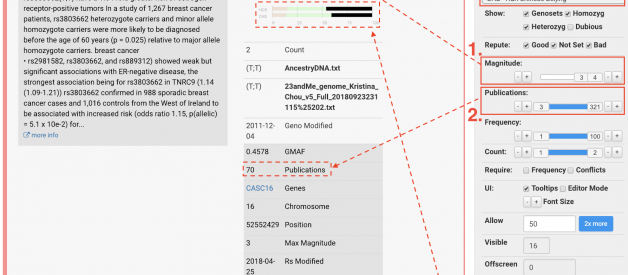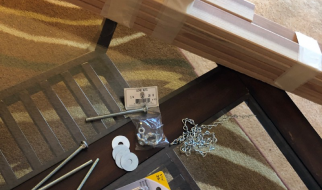Filter and sort your Promethease report ? Don?t let the overwhelming interface stop you from learning about your genetic health risks
If you?re like me or the 30+ million people who?ve gotten their DNA tested as of 2019, you?ve probably had enough time by now to dig through your 23andMe, AncestryDNA, MyHeritage or FTDNA report (among many others). Whether DNA testing was for ancestry and/or health purposes, you?re probably on the lookout now for more information beyond what your original test provided. Today I?m showing you how to make the most out of your Promethease report, by giving you suggestions on how to filter and sort it to produce the easiest, most digestible report.
Table of contents
- Promethease ? a tool for anyone to understand genetic health risks
- 3 filter suggestions for your report
- Breakdown of terminology
- 3 easy ways to sort your filtered report
Gotten a breakdown of your ancestry and a few health reports from your DNA test already?
If so, now?s the perfect timing to obtain your raw DNA data and upload it to third-party sites like Promethease, Genomelink*, GEDmatch** and the like. (Instructions to download raw data file from: 23andMe, Ancestry.com, MyHeritage, Family Tree DNA.)
Today I?m going to zero in on Promethease, where they give you a genetic report on health information for only $14. Personal opinion: while there are many different companies out there, Promethease is one of the best tools for anyone looking to dig into the specific SNPs (single nucleotide polymorphisms) that give rise to popular medical conditions, like Alzheimer?s, heart disease or breast cancer (eg. BRCA gene). If you?re unsure whether it?s right for you, you can always take a look at the free sample report first.
* Genomelink is a website that analyzes your raw DNA data for nutrition, fitness, personality and intelligence. The information is presented in a super easy-to-understand way, even for the DNA amateur. Discover what else your DNA predisposes you to. The first 25 trait reports are free. Try it here.
** If you?re more interested in investigating your (European) family history and genetic ancestry, hop on over to my piece on GEDmatch.
Promethease ? a tool for anyone to understand genetic health risks
Promethease is a literature retrieval system that pulls its information from SNPedia, a vast wiki of research studies on how genes affect (predominantly) medical traits. The genetic information is then mapped against the genetic data you uploaded to generate a personal DNA report on genetic health risks. Medical information based on your raw data has been notably hard to come by in consumer DNA tests, owing to strict FDA oversight. Combine that with Promethease?s not-so-friendly user interface, and we have many people missing out on the benefits of a Promethease report ? namely getting an idea of whether they have any medical risks to look out for.
That being said, there are clear limitations rooted in how Promethease functions. Details like the genetic variants referenced in a report not being corroborated by other research studies or having SNPs with contradicting results can really throw you off course. Many of these limitations can be controlled for by making use of the many filters they have.
So before we get into how to interpret your report, let me share my guidelines for pre-filtering the results. The main purpose is so that you don?t get unnecessarily overwhelmed when you first see your report, so feel free to adjust the specific numbers as you see fit. (Once you?re more familiar with the format, I encourage you to play around with the numerous filter settings.)
3 filter suggestions for your report
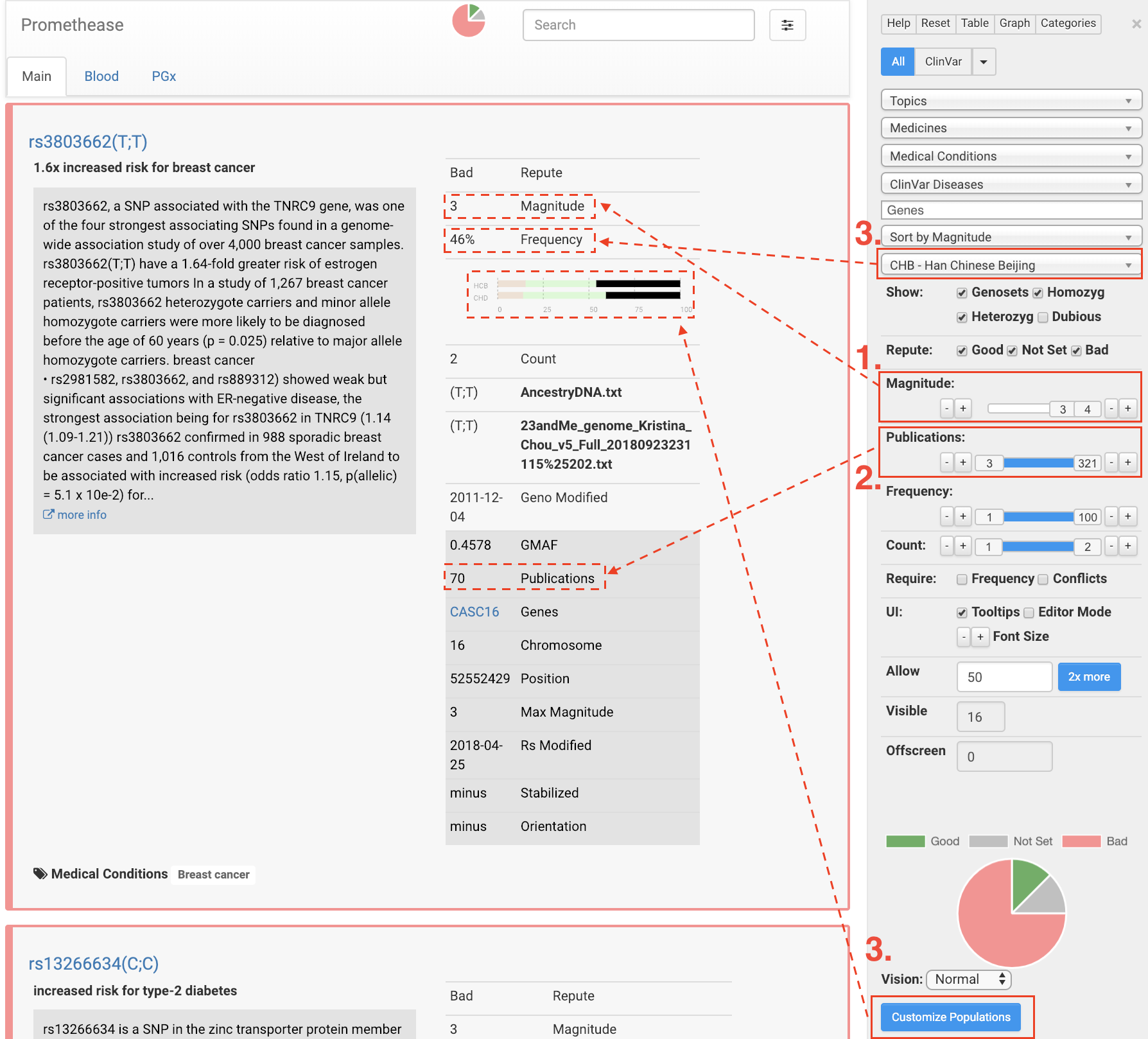
Step 1. Drag the ?Magnitude? lower-bound to 3 (max is 4)
- Magnitude is a ?subjective measure of interest?, which takes into account 1) how common your genotype is, 2) whether there are any known significant conditions linked to it. Magnitude is crowdsourced, and can be voted up or down by the community.
- I set my Magnitude lower-bound to 3 because SNPedia defines anything above that as ?probably worth your time.?
- Once you?ve looked through everything, it?s fun to adjust the lower-bound to 2.5 just to see what else the filter catches. (My Promethease report more than doubled from 16 to 41 items with this adjustment.)
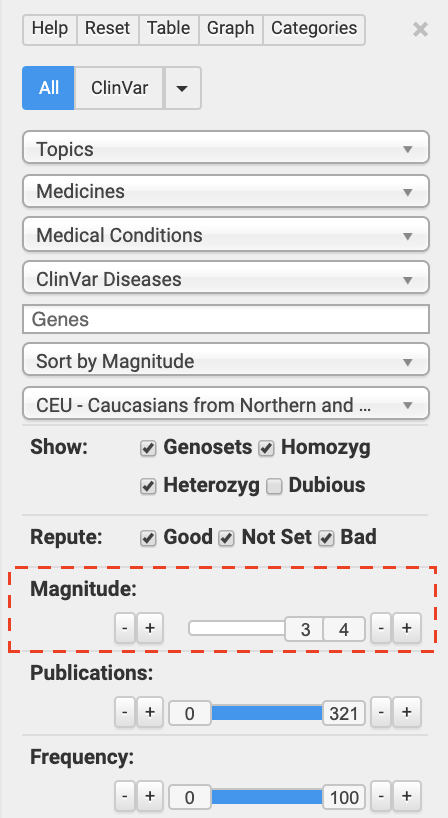 Step 1: On the right-hand panel, drag the lower-bound for Magnitude from 0 to 3.
Step 1: On the right-hand panel, drag the lower-bound for Magnitude from 0 to 3.
Step 2. Increase the ?Publications? count (to at least 3)
- SNPs with 0 Publications means they aren?t supported by any peer-reviewed scientific research, whereas 1 Publication means there?s only 1 study that found genetic variants (SNPs) linked to the condition.
- The more Publications there are implicating certain SNPs, the more established it is as a scientific ?fact? and therefore the more weight you should give to that finding.
- It is a good rule of thumb to have a finding be backed up by at least 3 Publications.
- For example, increasing my Publications count from 0 to 3 decreased the number of reports from 20 to 16. The missing 4 are likely not worth looking at.
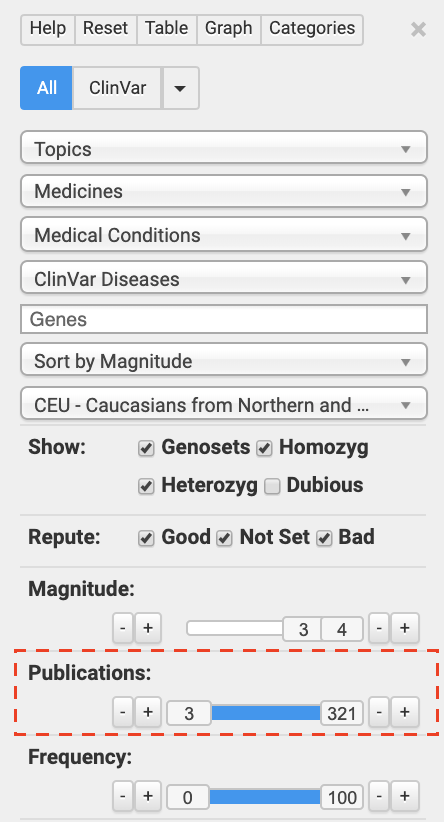 Step 2: On the right-hand panel, increase the Publications count from 0 to 3.
Step 2: On the right-hand panel, increase the Publications count from 0 to 3.
Step 3. Select your ethnicity with ?Customize Populations?
- For example, I selected ?CHB ? Han Chinese Beijing? and ?CHD ? Chinese in Metropolitan Denver, Colorado? as it reflects my ethnic background.
- Only the frequency distribution of genotype for the ethnicity(ies) you selected will be displayed
- Next, select your ethnicity from the population drop-down box. By doing so, the Frequency shown in your report will reflect the frequency of your specific genotype in the population you selected.
- This gives you an idea of how ?common? your genotype is.
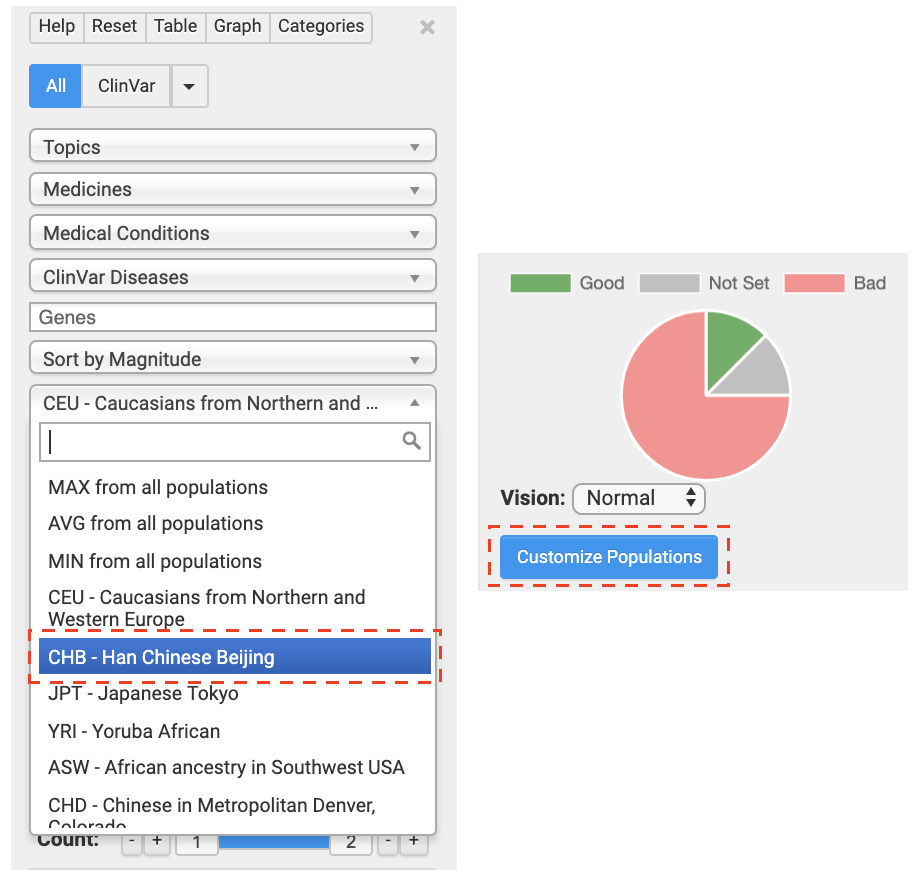 Step 3: Select your ethnicity from the drop-down box (left image). Then, click on Customize Population to select your ethnicity again (right image). Both are located on the right-hand panel.
Step 3: Select your ethnicity from the drop-down box (left image). Then, click on Customize Population to select your ethnicity again (right image). Both are located on the right-hand panel.
At this point, your report should be ready for you to dig into. Below is a brief description of the terminology, using one of my SNP reports (pictured below) as an example. This should be enough to get you started, but SNPedia FAQ or wikipedia are great resources to consult if you want to gain a more in-depth understanding.
Breakdown of terminology
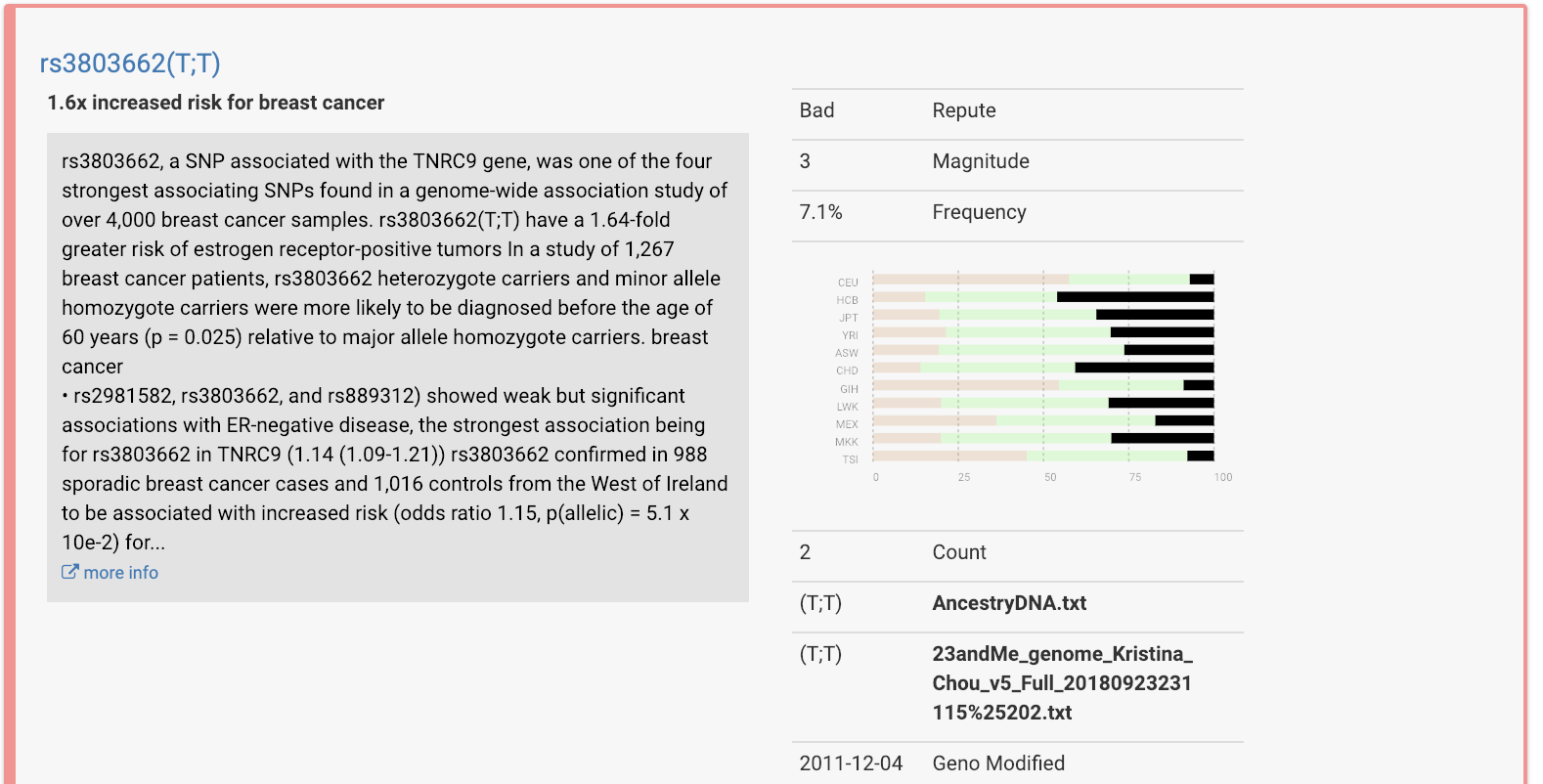
- rs3803662: The SNP ID. This report summarizes the association between this SNP and a number of human traits, in this case breast cancer.
- (T;T): The genotype. I am homozygous for the risk genotype, and have a 1.6x increased risk for breast cancer compared with people who are homozygous for the non-risk genotype (C;C).
- ?1.6x increased risk for ??: Your risk factor, compared to the average.
- Repute: whether your genotype is ?good? or ?bad? for you.
- Magnitude: How important the SNP is; whether there are any known significant conditions linked to it.
- Frequency: the frequency of your genotype in your selected population (ethnicity).
- Count: I uploaded both my AncestryDNA and 23andMe raw data. The ?2? indicates that both data files have the (T;T) genotype recorded for that SNP. The more data files you uploaded that agree on the SNP reading, the smaller the likelihood of a false positive result due to an error by your DNA test provider(s).
When going through your results, keep in mind what the risk factor really entails. For example, a 1.6x increased risk for breast cancer actually means that statistically speaking, those with my genotype (in the population for which the study was conducted in) have on average a 1.6x higher chance of developing breast cancer. What the ?average? and ?statistically speaking? may obscure here is that, many with the risk genotype will not develop breast cancer, and a number of people with the non-risk genotype may develop breast cancer anyway.
Family medical history is usually a great indicator for medical issues to take note of as you age. So I encourage you to compare your Promethease results with what you already know about the conditions and diseases family members have/have had. If there?s an overlap, you know what to proactively prevent against through lifestyle changes, substituting medication, etc.
Below I?ve listed up the 3 ways in which you can sort your report to get insightful information without getting bogged down by all the details.
3 easy ways to sort your filtered report
1. Default
If you?ve followed my pre-filter guidelines, you should be left with a relatively simple report to work with. With these setting, I only have 16 reports (or genos, as Promethease refers to it) ? 12 ?bad,? 2 ?good,? and 2 ?not set.? Personally, I?m only really interested in the ?bad,? ie. what I need to be looking out for, so I?m left with only 12.
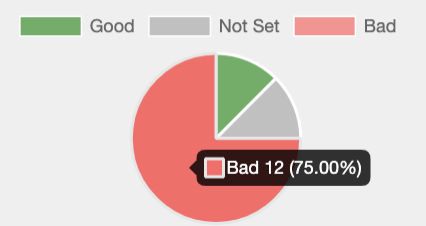 By filtering my report with the 3 steps described above, I?m left with only 12 ?bad? genos that may truly require my attention.
By filtering my report with the 3 steps described above, I?m left with only 12 ?bad? genos that may truly require my attention.
2. ClinVar
In the top right corner of the interface, select ClinVar. ClinVar focuses primarily on single-point mutations with high effect size, meaning high risk for a medical condition. My ClinVar filter returned a blank page for me based on my previous pre-filter settings (phew!). But if you see something here that?s also corroborated by family medical history, it may be wise to bring it up with your healthcare provider or a genetic counselor.
 On the right-hand panel, click on ClinVar to filter for medically relevant SNPs.
On the right-hand panel, click on ClinVar to filter for medically relevant SNPs.
3. Medicines
If you?re currently taking any medications, try plugging it into Medicines to check your body?s pharmacogenetic response to it. There are cases where people have found through genetic testing that their bodies don?t metabolize a certain medication well, and after switching to a different medication, seen improvements in their treatment.
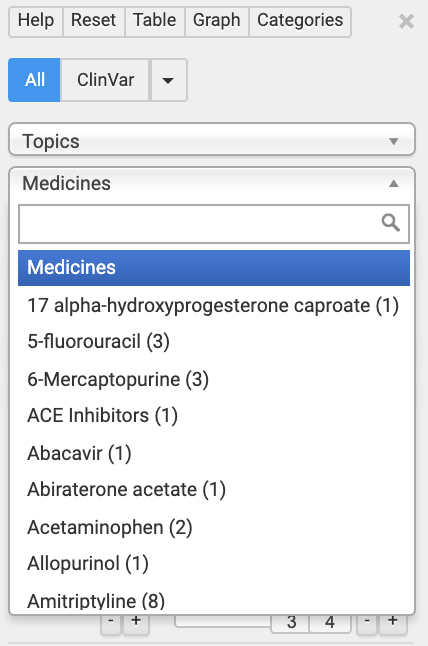 Search for medicines you?re taking (if any), to see if you have certain genotypes that affect how it is processed in your body.
Search for medicines you?re taking (if any), to see if you have certain genotypes that affect how it is processed in your body.
And there you have it! Remember to reach out to a genetic counselor if you found some unsettling information or are unsure of your results. Let me know in the comments below whether that was helpful, or if you have any questions about how to decipher your Promethease results. Or go straight to promethease.com and get started already!
Looking for something else you can do with your raw DNA data? Check out my comprehensive list of DNA upload products to try with your raw data.
This article was written by Genomelink, a genetic trait analysis service. Genomelink provides trait information on your nutrition, fitness, personality and intelligence. Discover what else your DNA predisposes you to besides health risks on Genomelink! First 25 trait reports free. Try it here.
